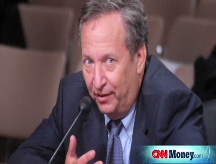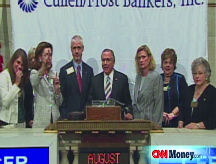Bailout needs time to work: Official
Head of Treasury program addresses criticism that banks are hoarding federal capital - says lenders are eager to put money to work once markets stabilize.
NEW YORK(CNNMoney.com) -- The government is pumping billions into the financial system under its $700 billion bailout plan, but it will take time before banks start lending, the Treasury official heading the effort said Monday.
Less than half of the $250 billion being injected into financial institutions has been distributed, said Neel Kashkari, interim assistant Treasury secretary for financial stability. It will take a few months to complete the investments, he said.
Also, since the capital markets remain fragile and confidence is still shaky, banks remain hesitant to lend, said Kashkari, speaking before the Securities Industry and Financial Markets Association. Once confidence returns, the government believes banks will use the capital to provide funding to creditworthy businesses and consumers.
"We've already heard from regional banks who have applied to the program and plan to use the funds to take on new borrowers," Kashkari said. "To many banks, this is just common sense."
Asked whether the government would make banks rework the mortgages of troubled borrowers, Kashkari said the industry has made progress, modifying 200,000 loans a month, though more needs to be done.
"We continue to work hard to get them to do more and help as many homeowners as they can," he said.
In the five weeks since Congress approved the bailout, the Treasury Department has focused on injecting capital into banks. Nearly 50 financial firms have won full or preliminary approval to receive a total of $172 billion in equity injections. The government has yet to award another $78 billion. Most institutions have until Nov. 14, though private banks have additional time.
However, institutions have come under fire for not increasing their lending despite all the government intervention.
Other companies, including the troubled car makers, are also clamoring for a piece of the government's largess.
While it is resisting coming to Detroit's rescue, the government on Monday moved to once again prop up troubled insurer American International Group (AIG, Fortune 500), using its new authority under the bailout plan.
AIG got a reworked $152.5 billion deal, as the Federal Reserve and Treasury Department made significant changes to the terms of the company's original bailout. Kashkari stressed this was a "one-off event" to ensure the system's stability, not the establishment of a new bailout program.
The Fed announced that it will reduce AIG's original $85 billion bridge loan to $60 billion, and it will cut the interest rate by 5.5 percentage points. In addition, the Treasury will use its special authority under last month's $700 billion bailout law -- the so-called Troubled Asset Relief Program -- to purchase $40 billion in preferred stock.
The new bailout was worked out between government officials and AIG executives over the weekend. AIG was having difficulty paying back its original bridge loan, which it intended to use to sell off many of its subsidiaries to restore the company to a stable condition. But the credit crisis has proven to be a difficult environment to spin off assets.
"This action was necessary to maintain the stability of our financial system," Kashkari said, noting that AIG must limit its executive compensation. "We recognize the financial system remains fragile and we continue to stand ready to prevent systemic failures."
The financial industry is also waiting for the government to roll out a plan to take troubled assets off banks' books -- the original aim of the bailout. Kashkari said it's up to Treasury Secretary Henry Paulson to decide when to take that step.
President-elect Barack Obama said Friday that he would review the implementation of the bailout plan to make sure it was accomplishing its goals of stabilizing the financial markets, protecting taxpayers and helping homeowners.
"It is critical that the Treasury work closely with the FDIC, [Department of Housing and Urban Development] and other government agencies to use the substantial authority they already have to help families avoid foreclosure and stay in their homes," Obama said. ![]()






